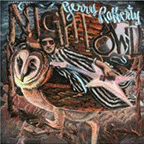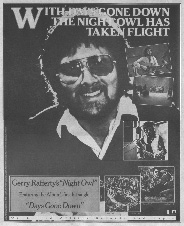![]()
  |

Night Owl
Gerry Rafferty
United Artists 958
Released: May 1979
Chart Peak: #29
Weeks Charted: 21
Certified Gold: 6/1/79
 Gerry Rafferty should be sitting on top of the world. Instead, he seems to be carrying its weight on his shoulders. It isn't every day that an artist breaks a three-year silence and immediately enjoys an international hit like last year's "Baker Street," not to mention several successful followups from the same album. But on his new LP, Night Owl, Rafferty shrugs like Atlas when he describes receiving the news that "Baker Street" was Number One in America, where he couldn't be bothered to tour. "Here we go for one more memory. Way back here in the twentieth century," he sings with weary bemusement -- and complains that his feet hurt.
Gerry Rafferty should be sitting on top of the world. Instead, he seems to be carrying its weight on his shoulders. It isn't every day that an artist breaks a three-year silence and immediately enjoys an international hit like last year's "Baker Street," not to mention several successful followups from the same album. But on his new LP, Night Owl, Rafferty shrugs like Atlas when he describes receiving the news that "Baker Street" was Number One in America, where he couldn't be bothered to tour. "Here we go for one more memory. Way back here in the twentieth century," he sings with weary bemusement -- and complains that his feet hurt.
Those lines are from "The Tourist," a title that sums up Rafferty's attitude toward rock & roll: he wouldn't want to live there, and it isn't even a particularly nice place to visit. Success will have a tough time spoiling Gerry Rafferty, because he always looks a gift horse in the mouth with his jaundiced eye. But his vision is clear, unclouded by psychoses or contradictions. Unlike, say, Elvis Costello, who's toured America indefatigably in pursuit of a stardom he purports to despise, Rafferty, the night owl, never blinks.
 Click image for larger view. |
Gerry Rafferty is the odd man out of rock & roll because his perspective is so radically different. After all, most rock is about instant gratification: we want the world an we want it now -- and if we don't get it, we protest or whine. But, for Rafferty, the present is a piddling blip in time that's "already gone," overwhelmed by both the past and the future. "I'm travelin' this long road with you/Still got a long way to go," he sings to his wife. No sooner does "Baker Street" hit the jackpot than it's simply "one more memory/Way back here in the twentieth century."
Night Owl harks way back to the nineteenth and eighteenth centuries and beyond. Though Rafferty and Hugh Murphy's production is once again glossy and up to the minute, the music is given an archaic, Gaelic feel through the use of accordions, mandolins, fiddles, recorders and penny whistles. In "Take the Money and Run," Raphael Ravenscroft's saxophone wails like a bagpipe on a blasted heath.
Because Gerry Rafferty expects so little from the long haul of life and love, his music is devoid of anger or self-pity -- and even of desire. A remarkably unsexy singer, he's grateful to his wife not because she turns him on, but because she occasionally lightens his gloom with a glimmer of understanding. The inevitable result of such resignation is a certain lack of energy -- the blandness that endears Rafferty to AM radio programmers. Thus the new record's title track begins with great promise as Hugh Burns' guitar snaps, crackles and pops percussively in the style of Robbie Robertson, only to disappoint when it comes to a sagging Polymoog bridge.
Which brings us to the crucial difference between 1978's City to City and Night Owl, an album I suspect won't sell quite as spectacularly. There was an expansiveness to City to City that reflected Rafferty's relief at having finally extricated himself from the contractual hassles that, according to his version of events, sabotaged Stealers Wheel (the group he co-led with Joe Egan) and kept him out of the studio for years. You could feel the exhilaration in Ravenscroft's saxophone riff in "Baker Street," a song about those hassles, while the gospel music that served as a subtext of sorts throughout the LP provided a subliminal uplift.
Night Owl, however, offers no easy, exuberant escapes. The arrangements are dense and clunky, with no open spaces in which soloists can kick up their heels. The gospel influence is gone, replaced by the dour, earthbound strains of country music, and the rhythms tend to trudge -- like life itself, in Rafferty's view.
If Rafferty's insistence that living is hard, grueling work is admirable for its stubborn integrity, it also encourages him to settle for the merely workmanlike in his music. Night Owl is beautifully and immaculately crafted, but it smacks of a certain cowardice -- as if the artist were so wary of being deluded he couldn't trust even the free play of his own melodic imagination. Because Rafferty doesn't dare to hope, he doesn't dare at all, and in playing it suspiciously, Night Owl ultimately pays it safe. Nothing here is as stark as City to City's "Whatever's Written in Your Heart," as frolicsome as "Mattie's Rag," as inspiring as "The Ark" or as ingenious as "Baker Street."
But when Gerry Rafferty pays yet another modest tribute to his wife, when he sings one more song that's infinitely sad and infinitesimally hopeful, his refusal to play the role of the hero becomes a kind of hard-bitten heroism. And the melancholy he'd never dream of inflating into melodrama becomes sweetly, profoundly moving.
- Ken Emerson, Rolling Stone, 8-9-79.
Bonus Review
Here's a musical memory test you should try on someone else's copy of this album -- don't spend money for your own unless you pass the test, which is in two parts. Ready? Here we go. Part one: play the album twice; now see if you can remember any of the melodies on it. If you can't, go on to part two: hum the melody line of Rafferty's previous hit, "Baker Street." No, no -- you're humming the saxophone riff that everybody remembers; that doesn't count, you have to hum the melody.
Did you fail the test? Don't feel bad; I did too. Really, this is a remarkable album. Even a close, determined listening yields nothing for the brain, heart, or feet. All the songs have much the same tempo, the breathy, thin vocals are all delivered at half power, and the instrumental accompaniment tick-tocks along without accomplishing anything. Even the "Baker Street"-style sax riffs don't hook up because there's nothing to hook on to in these songs. There's so much air in the material and performances that you could fly a jumbo jet through them. Amazing.
- Joel Vance, Stereo Review, 10/79.
![]() Reader's Comments
Reader's Comments
Roger Bellamy (Jan. 2022)
Most rock reviewers don't 'get' the mood of this album. It's of a man that realises that fame is very transient, there's always the pressure of living up to the standard of your greatest hit, knowing criticism is ever present when you fail.
It's a working class 'who the feck do you think you are', the daily, monotonous grind till you either retire or die. Blues but in a different genre.
Incidentally I lived in part of the studios where Night Owl and City to City were recorded 2013-4 - my wife had bought one of the four town houses shortly after they were converted from studios in 2004.